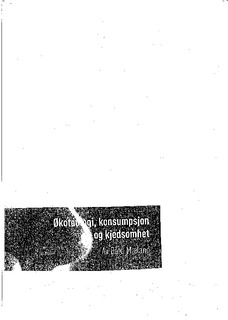| dc.description.abstract | This chapter aims to show how a state of boredom, individually as well as in society, may contribute counter-productively to solve our ecological crisis. Boredom contains two main problems: a problem of time, and a problem of place. To overcome the problems of the confined and boring place or the amount of too much empty time, strategies such as “killing time” and “movement for the sake of movement” are developed. Such strategies, however, will in our time, connected with the problems of climate change and global heating, often result in exploiting the environment, for example through excessive air travel or use of cars. It is argued that the Christian teaching on the Eucharist may display an alternative attitude to the environment, not formed by consumption virtues but by the “consummation” virtues of joy, gratefulness, fellowship, hope, and reduction. Such virtues may in turn reinforce care, concern and commitment for both our human neighbours and our common home: planet earth. | en |
